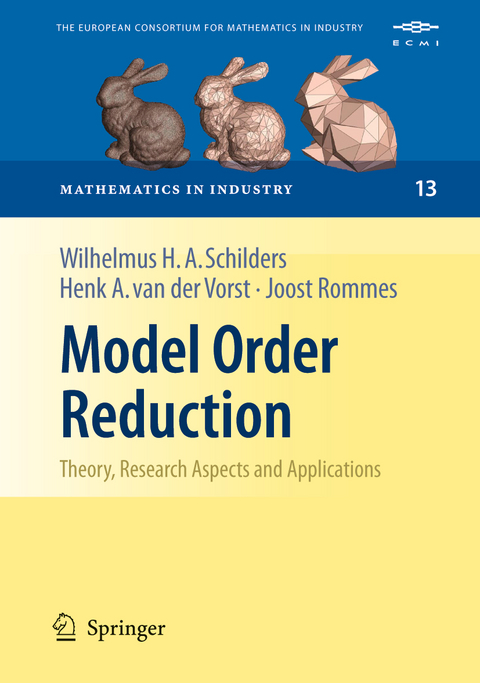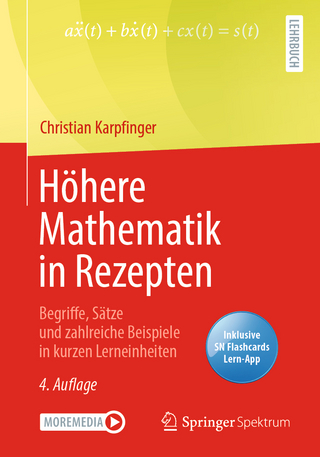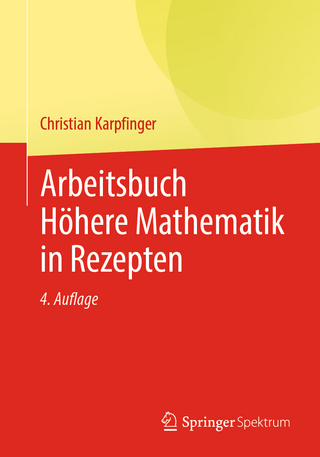
Model Order Reduction: Theory, Research Aspects and Applications
Springer Berlin (Verlag)
978-3-642-42773-2 (ISBN)
The idea for this book originated during the workshop "Model order reduction, coupled problems and optimization" held at the Lorentz Center in Leiden from S- tember 19-23, 2005. During one of the discussion sessions, it became clear that a book describing the state of the art in model order reduction, starting from the very basics and containing an overview of all relevant techniques, would be of great use for students, young researchers starting in the ?eld, and experienced researchers. The observation that most of the theory on model order reduction is scattered over many good papers, making it dif?cult to ?nd a good starting point, was supported by most of the participants. Moreover, most of the speakers at the workshop were willing to contribute to the book that is now in front of you. The goal of this book, as de?ned during the discussion sessions at the workshop, is three-fold: ?rst, it should describe the basics of model order reduction. Second, both general and more specialized model order reduction techniques for linear and nonlinear systems should be covered, including the use of several related numerical techniques. Third, the use of model order reduction techniques in practical appli- tions and current research aspects should be discussed. We have organized the book according to these goals. In Part I, the rationale behind model order reduction is explained, and an overview of the most common methods is described.
Wil Schilders received the MSc degree in pure and applied mathematics from Nijmegen University in 1978, and a PhD in numerical analysis from Trinity College Dublin in 1980. Since 1980, he has been with Philips Electronics, where he developed algorithms for semiconductor device simulation, electronic circuit simulation, and electromagnetics problems. He wrote two volumes on the numerical simulation of semiconductor devices, and published a special volume on Numerical Methods in Electromagnetics. Since 1999, he is part-time professor in numerical analysis for industry at Eindhoven University of Technology. He developed a novel method known as the Schilders factorization for the solution of indefinite linear systems. Since more than a decade, his interest is in model order reduction, and he is a frequent organizer of workshops and symposia on this topic. Currently, he is with NXP Semiconductors, heading the Mathematics group. Henk van der Vorst is a leading expert in numerical linear algebra, in particular in iterative methods for linear systems and eigenproblems. The techniques developed and used in these areas are of very high interest in model order reduction. Van der Vorst was the (co-) author of novel and highly important techniques, including incomplete decompositions, Bi-CGSTAB, and the Jacobi-Davidson method. The Bi-CGSTAB paper was the most cited paper in mathematics of the 1990's according to ISI in 2000. For the Jacobi-Davidson method he received, together with co-author Sleijpen a SIAG-LA Award for the best paper in numerical linear algebra over a three year period. Van der Vorst is Editor in Chief of the SIAM Journal SIMAX and he is member of the Netherlands Royal Academy of Sciences. Joost Rommes received the M.Sc. degree in computational science, the M.Sc. degree in computer science, and the Ph.D. degree in mathematics from Utrecht University, Utrecht, The Netherlands, in 2002, 2003, and 2007, respectively. During his PhD studies he worked on eigensolution methods with applications in model order reduction. Some of his developed methods are now used in software for circuit simulation and power system analysis. Joost Rommes currently works at NXP Semiconductors on model order reduction. In the electronics industry, an increase in complexity at transistor level leads to much large models that can not be simulated without accurate reduction techniques. Due to specific properties of the models, there is also need for different reduction techniques that can deal with these properties. This book provides a wide range of reduction techniques.
Basic Concepts.- to Model Order Reduction.- Linear Systems, Eigenvalues, and Projection.- Theory.- Structure-Preserving Model Order Reduction of RCL Circuit Equations.- A Unified Krylov Projection Framework for Structure-Preserving Model Reduction.- Model Reduction via Proper Orthogonal Decomposition.- PMTBR: A Family of Approximate Principal-components-like Reduction Algorithms.- A Survey on Model Reduction of Coupled Systems.- Space Mapping and Defect Correction.- Modal Approximation and Computation of Dominant Poles.- Some Preconditioning Techniques for Saddle Point Problems.- Time Variant Balancing and Nonlinear Balanced Realizations.- Singular Value Analysis and Balanced Realizations for Nonlinear Systems.- Research Aspects and Applications.- Matrix Functions.- Model Reduction of Interconnected Systems.- Quadratic Inverse Eigenvalue Problem and Its Applications to Model Updating - An Overview.- Data-Driven Model Order Reduction Using Orthonormal Vector Fitting.- Model-Order Reduction of High-Speed Interconnects Using Integrated Congruence Transform.- Model Order Reduction for MEMS: Methodology and Computational Environment for Electro-Thermal Models.- Model Order Reduction of Large RC Circuits.- Reduced Order Models of On-Chip Passive Components and Interconnects, Workbench and Test Structures.
| Erscheint lt. Verlag | 24.9.2014 |
|---|---|
| Reihe/Serie | Mathematics in Industry | The European Consortium for Mathematics in Industry |
| Zusatzinfo | XI, 471 p. |
| Verlagsort | Berlin |
| Sprache | englisch |
| Maße | 155 x 235 mm |
| Gewicht | 735 g |
| Themenwelt | Mathematik / Informatik ► Mathematik ► Algebra |
| Mathematik / Informatik ► Mathematik ► Analysis | |
| Mathematik / Informatik ► Mathematik ► Arithmetik / Zahlentheorie | |
| Mathematik / Informatik ► Mathematik ► Wahrscheinlichkeit / Kombinatorik | |
| Technik | |
| Schlagworte | algorithm • algorithms • Calculus • Dynamical Systems • linear algebra • Model • Model order reduction • numerical linear algebra |
| ISBN-10 | 3-642-42773-1 / 3642427731 |
| ISBN-13 | 978-3-642-42773-2 / 9783642427732 |
| Zustand | Neuware |
| Informationen gemäß Produktsicherheitsverordnung (GPSR) | |
| Haben Sie eine Frage zum Produkt? |
aus dem Bereich


